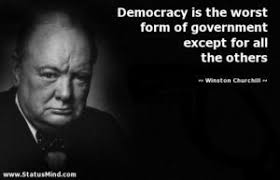
The Democratic Crisis
This is the fourth in a series of blog posts that I’m writing in the aftermath of the election. Entitled “bringing out the best in us,” I’m trying to figure out how we can use the transition in Washington and, now, the arrival of coronavirus vaccines to end 2020’s overlapping crises and create a more peaceful and equitable country and world. Taken together, they reflect the commitments we at the Alliance for Peacebuilding (AfP) made in response to President-elect Biden’s victory.
This one is about the threats facing democracy.
Most of these posts will be written from a peacebuilding perspective. However, this time I’ll start by drawing more on the other half of my career in which I was a fairly conventional political scientist and spent much of my time thinking about democracy. That led me to the pretty mundane conclusion that we have to protect our democratic institutions and norms.
However, once I added peacebuilding and systems theory to the mix, I realized that we political scientists haven’t been asking the most important question. We obviously need to protect democracy as we know it. However, it is just as important—and a lot more inspiring–to use the current crisis to bring out the best in us and take our democracy to a new level. If we don’t we might find ourselves in serious trouble indeed.
It is also the most superficial of the posts I’ve written so far in this series. While I’m sure that we need to strengthen democracy in these ways and more, it is by no means clear how we will make it happen, a topic I will be focusing on more in the posts to come.
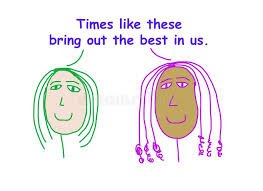
Bringing Out the Best in Us
This is the fourth in a series of blog posts on how we can bring out the best in ourselves in the aftermath of the 2020 presidential election and while all the other crises we are living through this year continue to rage. Writing them will be a learning experience for me, because I have a lot of threads to pull together which I will be doing as I read, talk with colleagues, and write. I will add links to the list below as I write.
In this first post, Defining the Best in Us, I explore the challenges we face in the aftermath of the 2o20 election.
Getting (politically) unstuck explores how peacebuilders can begin getting us out of the rut(s) we are in.
Here, I consider why reconciliation is so important today in the United States and beyond.
This post explores what we can do to meet the democratic crisis and improve life for us all.
Take on the Issues
Preventing Violence and Reducing Polarization
Beyond Dialogue for its Own Sake
Leverage Policy Makers
Where do we to from Here
The Worst Form of Government Except for All of the Others
I should start with part of my career’s backstory.
Building democracies was a key part of the comparative politics curriculum when I was in graduate school, but not in what I thought was a useful way given the politics of the early 1970s. Our mentors had experienced fascism and World War II first hand, many as refugees who fled totalitarian regimes in Europe.
As a product of the 1960s, my own interests lay elsewhere. Unlike my mentors, I was was convinced that we had outgrown the cultural norms, economic dislocations, and political instability that had fascism possible in the countries I studied and then started teaching about.
Democracy and its discontents did surge to the top of my agenda after I started teaching in the late 1970s with the beginning of a series of “waves” in which new and, at times, stable democracies were created in the rest of Europe, Latin America, East Asia, and Africa. Democratization truly grabbed my attention in the 1980s when my peace activism led me to add the Soviet Union to the countries I focused on in the classroom.
Still, when I was asked to write the first of what turned out to be ten editions of a textbook on comparative politics, I chose a way of dealing with democracy that—at least in retrospect—is at odds with the idealism that characterizes my life as an activist. I always thought of saving, supporting, and strengthening democracy as issues that mattered “out there,” but not in the United States or Western Europe which I focused on in most of my teaching and writing.
People with unusual beliefs are rarely asked to write mainstream textbooks. Mine succeeded at least in part because I found ways of cloaking my unusual ideas in a conventional-looking package. In this case, I covered all of the material you would have then found in market-leading books and added my blend of unusual ideas and quirky examples to the mix.
I played it particularly safe in discussing democracy. For our purposes here, the key was my decision to build the conceptual chapter around a famous statement by Sir Winston Churchill
Democracy is the worst form of government, except for all of the others.
It is not a particularly ambitious or inspiring definition even when you take Churchill’s track record and intended irony into account. To make things seem even less ambitious and inspiring, I crafted what might be called a minimalist set of criteria to use in determining if a country was democratic or not:
- Choosing the government through free and fair elections
- Protecting the rule of law in place?
- Ensuring basic human rights respected?
I then added two more criteria which are not always found in conventional definitions but which seemed important for ensuring democracy’s survival, though I expressed some doubts on the need for both of them.
- Creating tolerant political culture as part of a strong civil society
- Relying on a market-oriented economy
Other things could vary once those criteria were met, including the institutions a country chose to use, how individualistic it was, whether it adopted particular public policies, how much social and economic inequality it could tolerate and so on.
I don’t want to get into any of these themes in more detail here, since they should be familiar to most readers who would recognize the key terms in this typical word cloud for democracy, whether they took a course in comparative politics or not.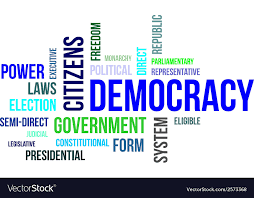
Still, I made the case that, whatever its flaws, democracy was better than the alternatives. In other words, I agreed that Churchill was right.
Today’s Threats
When it came to illustrating democracy in action, there were some gray areas, especially when it came to determining whether I could use the term established or secure in describing the regimes in places like India, South Korea, Taiwan, or the Czech Republic. Luckily, I could avoid the problem when it came to the countries that were big and important enough to include with full chapters in the book—the United States, United Kingdom, France, Germany, Japan, and Canada
When I finished the tenth edition in 2017, I could see that those well-established democratic regimes were not quite as secure as they were when I wrote the first edition in the early 1990s. Still, I did not expect them to be in the danger they find themselves in a mere three years late.
In other words, I’m still convinced that Churchill was right.
However, if that’s the best we can do, we deserve the problems that are breathing down or metaphorical necks.
As an American, it would be easy for me to blame the Trump presidency for those problems. However, as a comparative political scientist, I can’t do so. However much he has added to those threats, he had little or nothing to do with creating most of them or taking some of them to such dangerous levels.
You can see that in a number of issues that are affecting these and other once stable democracies. You also don’t need me to spell them out in any detail.
- Populism
- Nationalism
- Reactions against interdependence
- Climate change
- Inequality
- Racism
- Intolerance
- Immigrations
- Nostalgia for “better times” that never really existed
None have reached a point that they have put any of the five minimal definitions I mentioned earlier into jeopardy to such an extent that the democratic regime itself could collapse.
But they could. More ominously, we are already seeing signs that some key indicators are trending in the wrong direction—most notably those involving cultural norms.
Strengthening Democracy: A Big Hairy Audacious Goal
Obviously, we want to stem the tides that are threatening democracy. And, there are some wonderful initiatives underway that could make a difference by addressing some of the specific problems democracies like the one in the United States face, including the recent book by Robert Talisse which I’ve reviewed elsewhere that argued that we have “overdone” democracy and expect it to be a cureall.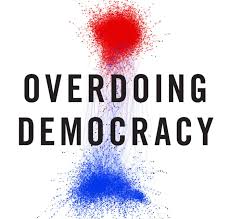
I reach a somewhat different conclusion. Thinking solely in terms of the kind of democracy we have today ends up selling ourselves short. This is where using a peacebuilding lens comes into play, though I will have to take three brief detours before we get there through the work of the Democracy Fund.
Beyond Making Counterarguments
Shortly before 9/11, I reconnected with my childhood friend, Dick O’Neill, who ran the Highlands Forum, which helped senior leaders at the Pentagon think outside the clichéd box. Dick helped me see that it rarely makes sense to make counterarguments that undermine existing beliefs as many of us soon did by talking about counterterrorism. Dick was not suggesting that we should ignore terrorism by a long shot. Instead, he wanted us to focus on constructive alternatives to it as he helped us do when he joined the Alliance for Peacebuilding board of directors a few years later.
Here, that means going beyond attempts to undermine the arguments made by the men and women whose actions undermine democracy. In addition, we have to develop ways of expanding what democracy means in ways that will draw millions of new activists to support a democracy that is more vital and egalitarian than anything we have seen so far.
Never Let a Good Crisis Go to Waste
Dick also introduced me to another one of Churchill’s one liners, though Sir Winston almost certainly was not the first person to use it:
Never let a good crisis go to waste.
We peacebuilders already had our own meme that we used under such circumstances. The way the ancient Chinese (at least according to some linguists) brought together the characters for danger and opportunity in conveying what we have in mind by the single word, crisis.
From that perspective, we need to focus on the opportunities the current crisis presents us with more than the dangers we face, because you need to reframe the issues in a new way that offers constructive alternatives to the status quo.
In this case, that means proposing a new and better version of democracy because we assume that phrases like “building back better” do not mean that we will return to a normal that existed before COVID and Donald Trump and everything in between.
In other words, bringing out the best in us means defining and working toward a very different future when it comes to democracy and all of the other issues which are on our agenda as 2020 mercifully draws to an end.
Big Hairy Audacious Goals
Coincidentally, I was reading BE 2.0, the update of Jim Collins and the late Bill Lazier classic book in which the term, big, hairy audacious goal made it into print for the first time. Adding their work to the mix finally got me out of an intellectual bind in which I settled for a minimalist definition of democracy in one half of my professional live while insisting on extremely visionary versions of peacebuilding in the other one.
Our BHAG (Collins’ acronym, not mine) will involve making progress on the specific issues such as health care, policing, economic equality, climate change, and a whole lot more which I’ll focus on next time. My guess is that we won’t get there unless and until we realize that what we mean by democracy has to be expanded.
Peacebuilding has to be in that mix.
The Democracy Fund
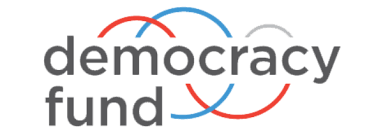 Luckily for our purposes, an organization which is closely affiliated with one of the most forward thinking peacebuilding networks is making progress in laying out what a new, stronger version of democracy could be like. The Democracy Fund was created in 2014 as part of the Omidyar Group, a network of organizations which use systems-based approaches in helping solve a variety of pressing social problems—including supporting democracy and peacebuilding.
Luckily for our purposes, an organization which is closely affiliated with one of the most forward thinking peacebuilding networks is making progress in laying out what a new, stronger version of democracy could be like. The Democracy Fund was created in 2014 as part of the Omidyar Group, a network of organizations which use systems-based approaches in helping solve a variety of pressing social problems—including supporting democracy and peacebuilding.
The fund is by no means the only group constructively working on democracy these days. It is, however, unique in anchoring what it does in systems theory which is the key to the future of democratization, peacebuilding, and just about everything else.
I write about systems theory a lot in these blog posts, most recently in one I did in an earlier series on recovering from the pandemic, We’re All In This Together. While I’ve developed those ideas in a lot more length in my most recent books on both comparative politics and peacebuilding, systems theory’s key principle meshes with the new realities of our globalizing world. Everything we do affects everyone and everything else either directly or indirectly.
And that means that our ways of thinking about and dealing with each other have to take those realities into account. In simplistic terms again, all of the Omidyar Group’s projects are based on the assumption that “what goes around comes around.”
In the six years since its creation, the Democracy Fund has invested over $150 million to strengthen the kinds of norms and institutions I laid out in my textbook definition and expand what we mean by democracy in an interdependent and globalizing world which did not exist when the great theorists developed those notions a century or more ago. As this image suggests, the Democracy Fund’s many projects focus on two broad themes, each of which is also part and parcel of what we peacebuilders who anchor their work in systems theory believe in.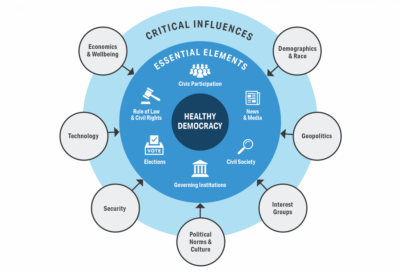
Strengthen the Democratic Core. The inner circle roughly mirrors the core themes in my conventional definition. For good or ill, the events of recent years have shown us that we fall short on many of them which is the first thing that the Democracy Fund wants to improve. One example should illustrate what I mean here. The Fund has a series of projects designed to enhance the way the media can enhance civic participation and, more generally, help people engage constructively in political life.
Go Beyond the Core. As the outer ring of “influencers” suggests, the Democracy Fund works on the assumption that we cannot achieve what it calls a healthy democracy as long as their significant barriers to democratic participation. Therefore, many of its projects explicitly take on the negative effects racial and economic inequality have on American democracy—whether my minimal criteria are met or not. As this complex systems map the Fund uses to guide its work suggests, as long as those kinds of impediments exist, they will continue to negatively impact the quality and effectiveness of any democratic regime.
 No short blog post can do justice to the Fund’s work. Therefore, I encourage you to spend the time to wander around its site and see for yourself why moving beyond the minimalist core is critical for the future of democracy and everything else we hold dear.
No short blog post can do justice to the Fund’s work. Therefore, I encourage you to spend the time to wander around its site and see for yourself why moving beyond the minimalist core is critical for the future of democracy and everything else we hold dear.
Next Time: Tackling the Issues
It is my contention that we won’t be able to make progress on any of the specific issues we face until and unless we take these kinds of steps to strengthen democracy in the United States and around the world.
That’s where I’ll pick up the thread next time.s
The views and opinions expressed in this article are those of the author and do not necessarily reflect the official policy or position of the Alliance for Peacebuilding or its members.
Also published on Medium.
